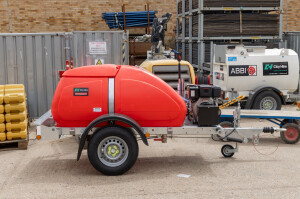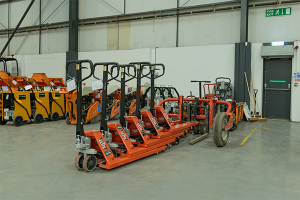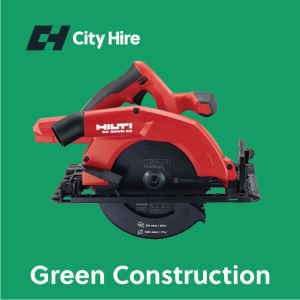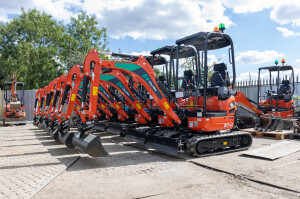
Conveyors are the unsung heroes of construction sites, silently working to move materials and equipment efficiently from one point to another.
With a plethora of conveyor types available, each designed for specific functions and applications, understanding their intricacies is crucial for construction professionals aiming to optimise operations and project outcomes. In this extensive guide, we delve deep into the world of conveyors, exploring their various types, functions, and typical applications in construction projects.
Conveyor Belts
Conveyor belts are a fantastic option for your construction projects if you are looking to streamline your site operations.
Function:
- Conveyor belts, portable and flexible, consist of a continuous loop of material supported by rollers or a frame, facilitating easy setup, adjustment, and relocation.
Applications:
- Material handling: Conveyor belts are the versatile workhorses of material transportation in construction. They efficiently move materials across uneven terrain, overcoming obstacles and facilitating seamless material flow throughout the construction site.
- Loading and Unloading: Construction projects involve a constant influx of materials arriving via trucks or containers. Conveyor belts streamline the loading and unloading process, ensuring efficient material transfer between trucks, storage areas, and construction zones.
- Temporary Work Areas: Flexibility is key in construction projects, especially in temporary work areas or confined spaces. Conveyor belts provide flexible material handling solutions, adapting to changing site conditions and transportation requirements with ease.
- Onsite Mobility: Construction sites are dynamic environments that demand mobility and adaptability. Conveyor belts offer onsite mobility, allowing construction crews to transport materials wherever they are needed, enhancing productivity and workflow efficiency.
Conveyor belts allow you to streamline your site operations with efficiency, increased productivity, space saving and safety. For these reasons, you should consider conveyor belt hire today.

Roller Conveyors
Roller conveyors feature a series of rollers supported within a frame where objects can be moved either manually or by power.
Function:
- Roller conveyors feature a series of rollers mounted on a frame, allowing for manual or gravity-based material movement.
Applications:
- Heavy Item Transport: Construction sites often deal with heavy items such as pallets, pipes, and large construction components. Roller conveyors are the go-to solution for efficiently moving these hefty materials across the site with ease.
- Assembly Lines: Construction projects involving prefabricated components or assembly tasks benefit from roller conveyors. They streamline assembly processes by facilitating the sequential movement of materials or components, ensuring smooth workflow and assembly efficiency.
- Loading Docks: Loading docks are bustling hubs of activity in construction sites. Roller conveyors enhance the efficiency of loading and unloading operations by providing a smooth transition for materials between trucks and storage areas.
- Warehouse Operations: Construction sites often function as temporary warehouses for storing materials and equipment. Roller conveyors aid in material handling and distribution within these temporary storage facilities, ensuring seamless logistics and inventory management.
If you are interested in roller conveyor hire, please contact our specialist team.
Screw Conveyors
Screw conveyors are typically designed to convey bulk materials at 15 percent, 30 percent or 45 percent trough loading, depending upon material characteristics of the specific bulk material.
Function:
- Screw conveyors, also known as auger conveyors, utilise a helical screw blade within a trough or tube to push materials along the conveyor's length.
Applications:
- Material Transfer: Screw conveyors are indispensable for transferring granular or powdered materials such as cement, grains, and dry bulk solids. Their efficient material transfer capabilities ensure a smooth flow of materials in construction processes.
- Mixing Operations: Construction projects involving concrete or other mixtures rely on screw conveyors for material transport. They transport materials from storage silos to mixing equipment or batching plants, ensuring consistent and precise material distribution for optimal mixing results.
- Precise Material Handling: Accuracy is paramount in construction projects. Screw conveyors excel in applications requiring precise material metering or distribution, ensuring that the right amount of material reaches the intended destination at the right time.
- Enclosed Transportation: Some construction materials require protection from external elements or contamination. Screw conveyors' enclosed design prevents spillage and contamination, making them suitable for transporting sanitary or hazardous materials safely.
If you are looking for screw conveyor rental for your construction site, please contact our specialist team.
Bucket Conveyors
Bucket conveyors are particularly useful for transporting materials vertically. Bucket conveyors offer a fantastic solution for the vertical transportation for small materials.
Function:
- Bucket conveyors, or bucket elevators, vertically transport bulk materials using buckets or cups attached to a rotating belt or chain.
Applications:
- Vertical Material Lifting: Overcoming height differences within construction sites requires efficient vertical material transport solutions. Bucket conveyors lift materials from lower to higher levels, enabling seamless material flow and optimising space utilisation.
- Silos and Hoppers: Storage silos and hoppers are commonplace in construction sites for storing bulk materials. Bucket conveyors load materials into these storage vessels, ensuring efficient material handling and storage management.
- Multi-Level Construction: Multi-level construction projects pose unique material handling challenges. Bucket conveyors facilitate material transportation between floors, eliminating the need for manual labour and ensuring efficient vertical material flow.
- Truck or Container Loading: Loading trucks or containers with materials requires precision and efficiency. Bucket conveyors aid in filling trucks or containers with materials, optimising loading processes and reducing downtime.
If you require bucket conveyor hire for your project, please get in touch with our specialist team.
Belt Conveyors
Function:
- Belt conveyors consist of a continuous loop of material, typically made from rubber, fabric, or metal, rotating around two or more pulleys. They serve as versatile carriers for a wide range of materials.
Applications:
- Material Transport: Belt conveyors are the workhorses of material transportation in construction. They excel in transporting bulk materials such as aggregates, gravel, sand, and concrete over long distances, ensuring a steady flow of materials throughout the job site.
- Loading and Unloading: Whether it's loading aggregates onto trucks or unloading cement from bulk carriers, belt conveyors play a vital role in the loading and unloading process, facilitating efficient material transfer with minimal manual labour.
- Stockpiling: Belt conveyors are instrumental in stockpiling materials at construction sites. By depositing materials in designated areas, they ensure organised storage and easy access, allowing construction crews to retrieve materials as needed without delay.
- Feeding Equipment: In construction, time is money. Belt conveyors expedite material handling processes by feeding materials into crushers or screening plants, ensuring a continuous flow of materials for processing and construction activities.
Conclusion
In conclusion, conveyors are indispensable assets in the construction industry, revolutionising material handling practices and streamlining construction processes.
By understanding the functions and applications of various conveyor types, construction professionals can make informed decisions to optimise workflows, enhance productivity, and achieve project success. Whether it's belt conveyors for long-distance material transport, roller conveyors for heavy-duty handling, screw conveyors for precise material transfer, bucket conveyors for vertical lifting, or conveyor belts for versatile onsite mobility, choosing the right conveyor system is paramount for maximising construction efficiency and effectiveness. With their reliability, adaptability, and efficiency, conveyors continue to play a pivotal role in shaping the landscape of construction projects worldwide.





